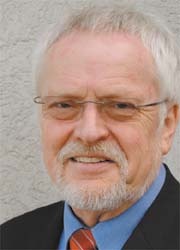Hospitals must be governed by business rules
In those European countries where citizens are entitled to comprehensive healthcare financing the healthcare systems are becoming increasingly daunting tasks. Whilst in some isolated cases medical progress may indeed lead to certain cost reductions, overall this inflates costs.

Moreover, with extended life expectancy the number of care-intensive patients will mount, thus contributing to rising healthcare costs.
Although these developments are obvious, politicians in Germany and other countries feed the illusion that in the future everyone will be able to obtain any state-of-the-art medical treatment. This is entirely unrealistic - at least in the current system of statutory health insurance. Today, the ‘pension lie’ – the often repeated affirmation that public pensions will continue to rise and cover the needs of pensioners – is complemented by a ‘health lie’. The DRG system, introduced in Germany as a pricing system, is used as a budget system. Combined with strict budget capping, this has deeply changed the hospital environment. Recent political healthcare reform has exacerbated this trend in the entire health system. Above all, this reform rang the death knell for the well-tried and successful administrative autonomy of the healthcare system. Health insurers were deprived of their independence and control over their income. If the planned health fund becomes reality, politics will control the income of health insurers and will – mere election tactics – tighten the health insurers’ financial flexibility even more. Additionally, to add insult to injury, politicians will hold the insurers and health providers responsible for their disastrous policies.
In 2009, following the so-called convergence, Germany will witness a further fundamental change in hospital financing. This coming reform aims to abolish, or at least entirely change, the principles of German hospital financing emplaced since 1971: planning, dual-source funding, pricing system.
Most importantly, the dual-source funding system, which means that capital investments are being funded by the state while operating costs are being paid for by the statutory health insurers, is to be replaced by overall financing schemes based on fixed, maximum or recommended (DRG) prices.
In Germany, the dual-source funding scheme has failed and, after a long transitional period, will be entirely discontinued. With tight public budgets the funds provided by the German Länder to finance capital investments by the hospital have shrunk. Consequently, there is an enormous investments backlog in many hospitals. Estimates show that over Euro 40 billion is urgently needed for necessary improvements.
Nevertheless, due to increasing competition and cost pressure, hospitals are forced to invest. They must create the precondition to implement more efficient workflows. To attract patients, hey must also offer modern equipment and effective medical care.
Where will they find the money for these investments? The answer to this crucial question depends to a large extent on whether we are looking at public/municipal, independent/not-for-profit or private hospitals.
Conventional loan financing will gain importance. But the hospitals’ financial and legal framework places tight restrictions on this option.
Therefore, to off-set the lack of public funding and complement often difficult loan financing, new and innovative funding schemes are needed. Such new schemes must take into account the current legal framework. Above all, it will not suffice to present old financing concepts dressed up with cool names.
In view of tighter budgets, hospitals should invest in a clearly targeted manner. The must also ensure their investments yield a reasonable return, including refinancing. However, this will not be enough! In recent months, medical employees have increasingly demanded the end of pure commercialisation of medicine and healthcare. However, they fail to say exactly what they mean. Before the reforms they sometimes threatened to pile dead patients on the hospital manager’s desk if certain equipment was not purchased.
Today, physicians understand that business rules also reign over hospitals. Put simply: Money spent for one item will not be available for another. Although this may sound banal, many physicians only learn that principle when they must handle their own budgets. It teaches them to become good money managers pretty quickly.
CV: Jürgen Abshoff studied economy, law and social sciences (Diplom-Volkswirt) at the University of Cologne.
His early professional experience includes consultancy for planning government approved hospitals for the North-Rhine-Westphalia Hospital Federation; employment by a leading German insurance firm, and a four-year focus on hospital finance and human resources at the German Hospital Federation. He has also been a finance committee member for the European Hospital Federation; advisor to the health committee of Germany’s National Parliament (Bundestag), and executive vice manager for the North Rhine-Westphalia Hospital Federation.
From 1984 to 2007, he was Managing Director of the Hamburg Hospital Federation, and was founder and member of the steering committee of the Co-operative for Quality Management in Hamburg Hospitals (EQS). Last year, be became President.
Following membership of various committees of the German Hospital Federation, last year he became a hospitals consultant.
Since 2006, he has also worked with quant GmbH, a service institution for quality management in healthcare, which organises the public German database for quality data in hospital care. He is also a member of the advisory council (Beirat) for the German health industry congress, and a member of the committee for Northern Germany of WIBERA / PWC (PriceWaterhouse Coopers).
01.03.2008




